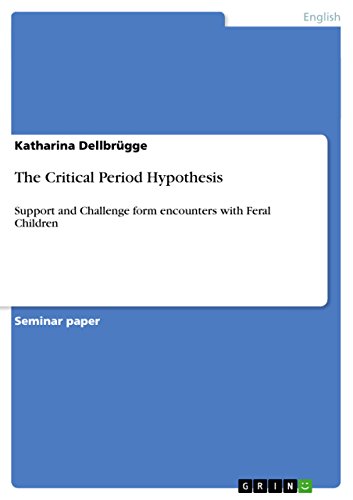Articoli correlati a The Critical Period Hypothesis: Support and Challenge...
The Critical Period Hypothesis: Support and Challenge form encounters with Feral Children - Brossura

Le informazioni nella sezione "Riassunto" possono far riferimento a edizioni diverse di questo titolo.
- EditoreGRIN Verlag
- Data di pubblicazione2010
- ISBN 10 3640545893
- ISBN 13 9783640545896
- RilegaturaCopertina flessibile
- Numero edizione2
- Numero di pagine32
Compra nuovo
Scopri di più su questo articolo
Spese di spedizione:
EUR 23,00
Da: Germania a: U.S.A.
I migliori risultati di ricerca su AbeBooks
The Critical Period Hypothesis
Descrizione libro Taschenbuch. Condizione: Neu. This item is printed on demand - it takes 3-4 days longer - Neuware -Seminar paper from the year 2008 in the subject English Language and Literature Studies - Linguistics, grade: 2,5, University of Cologne (Englisches Seminar), course: The Acquisition of English, language: English, abstract: Encounters with feral children have been attracting intellectual examination and curiosity since the early seventeenth century. Among others, Anthropologists, Psychologists and Linguists hoped to find answers to central questions of mankind: What makes us human beings What distinguishes us from animals Nature or nurture, what has greater impact on us In linguistics these case studies are frequently cited. Especially with respect to the assumption of maturational constraints on language acquisition, scholars tried to draw conclusions from the success or failure feral children exhibited after discovery. Respectively, they were interpreted as evidence or counter-evidence for the Critical Period Hypothesis (CPH) which postulates that language can only be acquired normally up to a certain age.This term paper is organised as follows. In Section 2 a general de-scription of critical periods is given before turning to Lenneberg's hypothesis. Section 3 focuses on two cases that are often taken as evidence for the CPH, namely Victor and Genie. Both didn't master language acquisition to a satisfactory level. Section 4, on the other hand, deals with three children who are expounded as counter-evidence for the CPH because they caught up quickly on language learning close to age seven. In both sections, after a short description of the individual experiences prior to dis-covery, a detailed account of linguistic achievements and shortcomings is presented. Section 5 will discuss the outcomes and put them into a broader scientific context by adding results of further research. Section 6 offers a preliminary conclusion, namely that cases of feral children should be included as indirect evidence but that this needs to be done carefully. 32 pp. Englisch. Codice articolo 9783640545896
The Critical Period Hypothesis : Support and Challenge form encounters with Feral Children
Descrizione libro Taschenbuch. Condizione: Neu. Druck auf Anfrage Neuware - Printed after ordering - Seminar paper from the year 2008 in the subject English Language and Literature Studies - Linguistics, grade: 2,5, University of Cologne (Englisches Seminar), course: The Acquisition of English, language: English, abstract: Encounters with feral children have been attracting intellectual examination and curiosity since the early seventeenth century. Among others, Anthropologists, Psychologists and Linguists hoped to find answers to central questions of mankind: What makes us human beings What distinguishes us from animals Nature or nurture, what has greater impact on us In linguistics these case studies are frequently cited. Especially with respect to the assumption of maturational constraints on language acquisition, scholars tried to draw conclusions from the success or failure feral children exhibited after discovery. Respectively, they were interpreted as evidence or counter-evidence for the Critical Period Hypothesis (CPH) which postulates that language can only be acquired normally up to a certain age.This term paper is organised as follows. In Section 2 a general de-scription of critical periods is given before turning to Lenneberg's hypothesis. Section 3 focuses on two cases that are often taken as evidence for the CPH, namely Victor and Genie. Both didn't master language acquisition to a satisfactory level. Section 4, on the other hand, deals with three children who are expounded as counter-evidence for the CPH because they caught up quickly on language learning close to age seven. In both sections, after a short description of the individual experiences prior to dis-covery, a detailed account of linguistic achievements and shortcomings is presented. Section 5 will discuss the outcomes and put them into a broader scientific context by adding results of further research. Section 6 offers a preliminary conclusion, namely that cases of feral children should be included as indirect evidence but that this needs to be done carefully. Codice articolo 9783640545896

